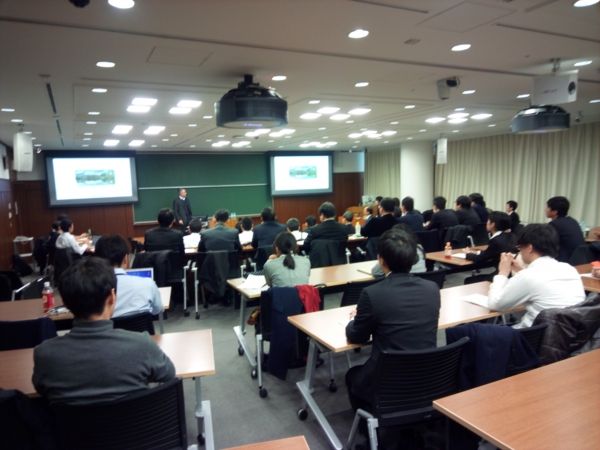核酸を標的とした低分子創薬研究会 第4回
日時: 12月15日(金曜日) 午後2時〜
会場: 富国生命ビル 5F 立命館大学大阪梅田キャンパス 演習室2
プログラム: 第4回ちらし.pdf
1. 挨 拶 研究会企画委員長 中谷 和彦
2. 研究会 #4
米国スクリップス研究所 Matthew David Disney 博士
「Sequence-based rational design of precise small molecules targeting RNA」
懇親会 午後5時頃より
富国生命ビル4F 立食パーティー(会費2千円)
Professor, Department of Chemistry
Graduate Program Faculty Member, Kellogg School of Science and Engineering
Positions:
- Regional Editor for the Americas, Bioorganic and Medicinal Chemistry Letters
-Scientific Advisory Board, The University at Albany The RNA Institute
Education:
B.S., Chemistry, The University of Maryland, College Park, 1997
M.S., Physical Chemistry, The University of Rochester, 1999
Ph.D., Chemistry, The University of Rochester, 2003
Post Doctoral Fellow: The Massachusetts Institute of Technology and
ETH Zürich – Eidgenössische Technische Hochschule Zürich, 2002-2004
Awards and Honors:
• NIH Director’s Pionneer Award, 2016
• Tetrahedron Young Investigator Award in Bioorganic and Medicinal Chemistry, 2016
• David W. Robertson Award in Medicinal Chemistry, 2014
• Excellence Award in the field of Research in Science and Technology. India-US Chamber of Commerce, Inc., South Florida. 2013
講演要旨
Sequence-Based Rational Design of Precise Small Molecules Targeting RNA
Matthew D. Disney
Department of Chemistry
The Scripps Research Institute
A challenge in biomedical research is to rapidly convert genome sequence into lead drugs. In this talk, I describe a series of synergistic approaches that allows one to quickly and accurately convert genome sequence, namely the RNA products of the genome, into lead therapeutic targets. The general approach described herein is very different from typical drug discovery efforts that often rely on screening of a single drug target to identify lead compounds. Rather, it is an attempt to advance a rational, predictable approach to drug disease-causing RNAs with small molecules. I will describe various aspects of this technology that includes the development of rapid screening assays to assess and score the binding of small molecules to RNA folds. The approach is target agnostic but by using this binding information, one can mine the transcriptome (RNA sequence) for these folds to rationally identify druggable RNA targets for small molecules via an approach named Inforna (see: Nat Chem Biol. 2014 Apr;10(4):291-7. doi: 10.1038/nchembio.1452.).
Amongst several advances in this area, we will describe efforts to design bioactive small molecules that target cancer-causing non-coding RNAs and, if time permits, RNA repeat expansions that cause incurable rare disease. For example, small molecules have been rationally designed to target oncogenic microRNA-96 (see: Nat. Chem. Biol. 2014. 10(4):291-7. doi: 10.1038/nchembio.1452 and Proc. Natl. Acad. Sci. U.S.A. 2016. 113(21):5898-903. doi: 10.1073/pnas.1523975113.), -210 (J. Am. Chem. Soc. 2017. 139(9):3446-3455. doi: 10.1021/jacs.6b11273.), and -18a (ACS Central Science. 2017. 3(3):205-216. doi: 10.1021/acscentsci.7b00009) that are causative of various cancers including breast and prostate. In addition, chemical approaches to identify the on- and off-targets of small molecules targeting RNA will be presented, namely Chemical-Cross-Linking and Isolation by Pull Down (Chem-CLIP, J. Am. Chem. Soc. 2017. 139(9):3446-3455. doi: 10.1021/jacs.6b11273, and others). This approach has demonstrated selective binding of small molecules to the RNAs to which the compounds were designed to target in cells. Chem-CLIP and other studies have also elucidated factors affecting the ability of small molecules to selectively and potently target microRNA precursors. Lastly, the ability of these compounds to affect tumor burden in mouse models of cancer will be presented and the activities of these small molecules compared to that of antagormirs, which recognize their target via Watson-Crick base pairing to mature microRNAs. In summary, it appears that non-coding microRNA precursors may be more druggable with small molecules via rational and predictable approaches than previously realized.
【開催場所】
- 富国生命ビル5F
- (大阪市北区小松原町2-4 )
参加申込書 ダウンロード(WORD形式)
お問い合わせ
核酸標的低分子創薬研究会
大阪大学産業科学研究協会 事務局
Email: RAIS@sanken.osaka-u.ac.jp
Tel/Fax : 06-6948-6902


